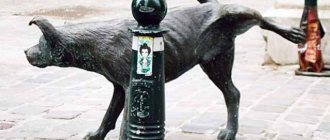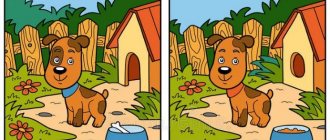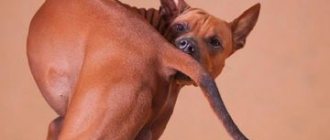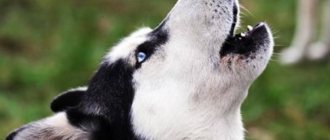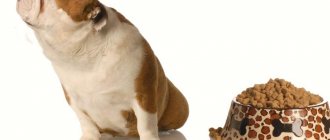Reasons for eating the earth
Pica or perverted appetite, in which an animal’s taste preferences change, is noted in both puppies and adult dogs, regardless of their breed.
Dogs, especially puppies, exploring the world around them, try to taste everything. This is a completely normal pattern, so don’t be surprised or immediately panic if your dog eats some soil while on a walk.
But if a dog eats soil with great pleasure and does it constantly, it is possible that this is the first signal about the development of possible systemic failures or pathologies. In addition, consuming large amounts of soil can lead to serious problems.
Reasons for eating land:
- Lack of attention, banal boredom. As a rule, in this way the animal wants to attract the attention of its owner.
- Severe stress, fear, emotional shock, depression, psychological discomfort. A dog eating soil can be caused by moving, a long separation from its beloved owner, rude attitude, or the appearance of other animals in the house.
- Worm infestation. If a dog is infected with worms, intestinal parasites disrupt digestion, cause discomfort, and poison the body with toxins.
- Deficiency of nutrients, hypovitaminosis, caused by an unbalanced, meager, monotonous diet. Most often, dogs eat soil when the body does not receive enough iron, potassium, calcium, and other minerals from food or feed.
- Disturbances in the functioning of the gastrointestinal tract, failures of metabolic processes.
- Endocrine pathologies (diabetes mellitus).
- Immunodeficiency. Against the background of this pathology, iron deficiency anemia develops. The number of red blood cells in the blood decreases, which leads to disruption of oxygen metabolism in tissues and organs. Since the soil contains iron, by eating it the dog compensates for the deficiency of the microelement.
Important! If the dog’s behavior has changed dramatically, the dog has begun to greedily eat earth, sand, stones, and other inedible objects, the dog is showing aggression, other uncharacteristic signs and symptoms are noticeable, take the animal to the clinic for examination. Pica is one of the symptoms of rabies, pseudorabies.
Eating of earth, sand, and stones is observed in puppies during the period of changing baby teeth. In this case, provide your pet with a variety of “chew” toys.
Dog eats stone problems - reasons
There are many reasons why a dog eats rocks, however, here we will list the most common reasons why a dog eats rocks :
- Itching in Dogs Pick's syndrome in dogs (obsessive behavior) is a pathology that causes the ingestion of all types of food, including dirt, rocks and rocks. For more information, read Why does my dog eat everything in sight?
- Puppy Discovery : Does Your Puppy Eat Gravel ? It is completely normal for the puppy stage to bite and swallow all sorts of objects, including rocks. While this is normal, it is not acceptable behavior. However, you should never remove a stone from your dog's mouth, as this can quickly swallow the stone. Ideally, you should use this as an opportunity to teach your dog to throw objects with positive reinforcement and without force...
- Stress and anxiety. – Stress in dogs can be caused by various reasons such as lack of exercise, confinement, lack of mental stimulation, constant punishment, etc. A dog that is stressed or anxious will try to release this pent-up energy by chewing excessively or eating rocks . This type of behavior is incredibly common in shelter dogs. Is your dog stressed? Find out by reading our list of 10 signs your dog is stressed.
- Grooming Demand – Dogs who spend hours on their own or do not receive enough attention may consume rocks or other inedible objects (in addition to inappropriate behavior) to get the attention of their handlers. The dog would rather be punished than not receive any attention. This usually only happens in extreme cases.
- Parasite Infestation - Some research suggests that in the wild, dogs eat plants or grasses to eliminate intestinal parasite infestations. If you notice that your dog is showing signs of intestinal parasites, such as scratching or dragging his rear end, in addition to eating rocks, consult your veterinarian as soon as possible. For more information, we recommend you read our article where we discuss everything you need to know about dewormed dogs.
A dog eats soil: how can it be dangerous?
Many breeders are interested in the question of what to do if a dog eats soil and how it can be dangerous? In general, if your pet has eaten a small amount of dirt and doesn't do it consistently, don't panic. Observe your dog's behavior, especially while walking.
The main danger is that the soil may contain helminths that cause helminthiasis, pathogenic microorganisms that lead to the development of various dangerous viral infections. Do not forget that under favorable conditions, fungi, viruses, and bacteria retain their virulence for a long period of time.
Important! Eating soil in large quantities can cause intestinal blockage and metabolic disorders. With soil, foreign objects often enter the animal’s body, which injure the mucous membranes of the gastrointestinal tract and can cause internal bleeding.
Eating soil, stones, and sand negatively affects the condition of teeth. The enamel is erased, the gums are injured, cracks and splits appear on the teeth.
In addition, soils, especially black soils, may contain fertilizers, pesticides, chemical compounds, potent poisons, reagents, and other substances that are unsafe for the body. In large quantities, these substances cause neurological disorders, intoxication, severe acute poisoning and even death.
The dog chews stones
Eating stones is a dangerous bad habit. In the process, your pet may break teeth or injure his gums. Boulders clog the intestines and stomach. In the worst case scenario, your pet will suffocate trying to swallow a stone that is too large. What to do? First you need to understand the causes, and then eliminate the consequences.
How to properly adjust your dog's diet
Most often, by eating soil, the animal compensates for the deficiency of minerals, vitamins, and other useful substances, so it is necessary to correctly adjust the dog’s diet.
When feeding a natural diet, be sure to give your pet ready-made vitamin-mineral complexes and multivitamin supplements.
- Supplement your diet with not too juicy, sweet fruits and berries. Give raw, stewed, boiled vegetables (zucchini, carrots, bell peppers, beets), and herbs daily.
- In winter, plant oats and special grass for animals in containers at home.
- If your dog is deficient in iron, give your pet veal, lamb, veal liver, and beef tripe every 3-5 days.
- Supplement your diet with dry yeast, fish oil, and meat and bone meal. Place a piece of chalk and charcoal near the bowl.
After adjusting the diet, as a rule, dogs lose interest in eating soil.
Advice! Vegetables, for better absorption by the dog’s body, season with a small amount of vegetable oil.
If the dog is kept on a ready-made diet, use “super-premium”, “premium”, “elite” category, holistic products for feeding. High-quality food, unlike the “economy” class, is made from natural ingredients and has a completely balanced composition. When choosing food, always take into account the age, breed characteristics, and activity level of the pet.
How to wean a dog
Take general preventive measures first. Regardless of the reasons, they will help prevent relapse.
Pay more attention to the dog.
If you play and walk with your pet more often, he will no longer need to “beg.” In addition, the companion will get tired and release pent-up energy naturally, so he will become less mischievous.
Make sure your furry friend has plenty of toys.
Some dogs just like to chew things. If this is the case, you can quickly and easily switch your pet’s attention to more “pleasant” tires. It is important to constantly change toys in the public domain so that your pet does not get bored with them.
Watch your diet carefully.
Review your dog's diet.
Does she have enough nutrients? If you are a supporter of natural products, read articles on this topic. It is important for dry food buyers to know that only super-premium and holistic brands are suitable for regular use. Economy and Premium are strictly not recommended for dogs. It is not difficult to wean your companion if you have ruled out the reasons. If your pet reaches for a boulder, sharply give a prohibiting command. It is acceptable to jerk the leash, but it is better to do without it. Switch your furry friend's attention to more useful things. For example, for training. Offer a treat for each command. The dog will quickly understand that it is much more pleasant to communicate with the owner.
Puppies can chew and eat unusual objects even in ideal health. New habits in an adult animal are a warning sign. It is important to contact a veterinarian in time. If necessary, he will conduct an examination and prescribe supplements or medications.
Why do dogs eat pebbles?
If a puppy does this, then there is nothing to be surprised about. He can eat anything out of simple curiosity and interest in the world around him. Children, too, put everything in their mouths, learning about the world.
Puppies also do this because they are changing teeth, and during this process they are bothered by itching. So they scratch their gums with stones. If young pets are distracted from this habit and replaced with safe toys, then after a while the dog will stop showing interest in the stones.
Lack of minerals and vitamins is another cause of pathological addiction. This also includes a violation of the intestinal microflora. It also encourages dogs to do strange, from our point of view, actions. By the way, for the same reason, dogs eat plaster, chalk, soil, and gnaw corners in the house. Experts call all this a perverted appetite.
Helminth infections can also provoke a dog's craving for eating stones. In this case, it is recommended to worm the animal and do this simultaneously to all children living in the house.
Often this habit in dogs is caused by simple boredom. Eating pebbles becomes simply entertainment for the dog, a desire to learn a new taste. It is interesting for an animal to run away from its owner with stones in its mouth. Isn't that a consolation?
Another atypical cause of a dangerous habit is diabetes. Eating stones is sometimes a symptom of an endocrinological disease.
